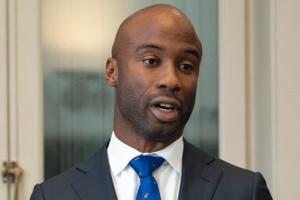Current News
/ArcaMax

Central Appalachian commissioners rubber stamp 'no' vote on mega landfill project
PIKEVILLE, Ky. — A project from an out-of-state waste management company to build a mega landfill on an abandoned coal mine in the central Appalachian community of Myra is dead after Pike County commissioners affirmed their decision to back out the contract this week.
Over the strong objections of Judge-Executive Ray Jones, he and the ...Read more

Thousands flee Beirut suburbs after unprecedented Israeli evacuation order
BEIRUT — The Israeli military issued evacuation orders for entire neighborhoods of Beirut's southern suburbs, sparking pandemonium as hundreds of thousands of people joined a panicked exodus out toward Lebanon's north.
On Thursday afternoon, the Israeli military's Arabic-language spokesman told residents of the Dahieh — the Hezbollah-...Read more

Nancy Guthrie kidnap probe hits another dead end with DNA results on found gloves
In another setback for the Nancy Guthrie kidnap probe, DNA on a glove found in the first weeks of the investigation turned out to belong to a restaurant worker and is unrelated to her masked abductor, officials said.
The news came as Savannah Guthrie, one of Nancy’s daughters and co-anchor of NBC’s “Today” show, on Thursday made an off-...Read more

NYC schools Chancellor Kamar Samuels taps top deputy, shakes up superintendent oversight
NEW YORK — New York City Schools Chancellor Kamar Samuels picked his Cabinet Thursday, with a longtime education official as his top deputy and an organizational shakeup of the nation’s largest school system’s upper ranks.
Danielle Giunta, who was first promoted by former Chancellor David Banks to help develop school leadership, was ...Read more

More than half of Pennsylvanians oppose ICE's methods under Trump, new poll finds
PHILADELPHIA — Pennsylvania voters broadly oppose some of President Donald Trump's immigration enforcement tactics — but there's a stark partisan split, according to a new statewide poll of registered voters.
Franklin & Marshall College's Center for Opinion Research released a wide-ranging poll Thursday that tracked registered Pennsylvania ...Read more

KC officials worry: City's new temporary jail 'looks like an ICE detention center'
KANSAS CITY, Mo. — Weeks after Kansas City publicly pushed back against the possibility of turning a local warehouse into a federal Immigration and Customs Enforcement detention center, city officials are looking more critically at their own jail project.
At first glance, some City Council members drew parallels between ICE facilities or ...Read more

Cabello warns Maria Corina Machado of 'surprise' if she returns to Venezuela
Venezuelan Interior Minister Diosdado Cabello issued a thinly veiled threat against opposition leader and Nobel Peace Prize laureate María Corina Machado, warning that authorities have a “surprise” prepared for her if she returns to the country during the upcoming Easter holiday.
Speaking Wednesday on his weekly television program Con el ...Read more

Iran vows to escalate attacks as Trump hails progress in war
The U.S.-Israeli war on Iran waged for a sixth day with little sign of easing, as the Islamic Republic vowed to intensify its retaliation and oil extended gains.
Arab states across the Middle East — as well as Israel — reported interceptions of Iranian missiles and drones on Thursday, with Qatar telling residents to remain indoors due to ...Read more
Ukraine says peace talks with Russia on hold due to Iran war
U.S.-brokered peace talks between Kyiv and Moscow initially planned for this week are postponed indefinitely due to the war in Iran, according to Ukrainian President Volodymyr Zelenskyy.
“For now, because of the situation with Iran, the necessary signals for a trilateral meeting haven’t come yet,” Zelenskyy said in his regular address to ...Read more

Strait of Hormuz escorts risk triggering Iran anti-ship missiles
President Donald Trump’s suggestion that the U.S. would insure and protect oil tankers and other vessels passing through the Strait of Hormuz may potentially bring Iran’s anti—ship missiles into play, adding a new dimension to a conflict largely defined by air power.
Iran is known to have at least six types of such missiles, according to ...Read more

Florida Legislature won't pass vaccine exemption bill this session
TALLAHASSEE, Fla. — Florida’s Legislature won’t change the state‘s vaccine laws this session.
Although the Florida Senate is set to pass legislation that would make it easier to opt out of vaccines that are required for school, House Speaker Daniel Perez on Wednesday confirmed the bill would not move forward in his chamber.
“That’s...Read more

Iran vows to escalate attacks as Trump hails progress in war
The U.S.-Israeli war on Iran entered a sixth day with little sign of easing, as the Islamic Republic vowed to intensify its retaliation and oil extended gains.
Arab states across the Middle East — as well as Israel — reported interceptions of Iranian missiles and drones into Thursday, with Qatar telling residents to remain indoors due to ...Read more

Outer Banks erosion reveals buried whale, NC group says. 'Stinks to high heaven'
Worsening beach erosion on North Carolina’s Outer Banks is now being blamed for something down right creepy: Digging up a dead whale, according to coastal community leaders.
It’s happening in Corolla and the Corolla Civic Association says the grave is being repeatedly uncovered and recovered at the whims of the tide.
“Approximately four ...Read more

Families defend disability services amid Medicaid cuts
Families of Idahoans with disabilities say their lives could be upended as lawmakers in the state’s Republican-dominated legislature mull sweeping cuts.
Services at risk include the 24/7 care that allows a 39-year-old with cerebral palsy to live independently; the in-home caregiving that lets a 26-year-old with brain damage from a hemorrhage ...Read more

States try 'public option' Obamacare plans to reduce coverage costs
Nearly two decades ago, progressives fought to include a so-called public option — a government-run health plan — in the broad health care overhaul known as Obamacare. That effort failed, defeated by heavy lobbying from the insurance industry and opponents who decried it as a government takeover of health care.
But the final Affordable Care...Read more

Federal aid for lead cleanup is receding. That's a problem for cash-strapped cities
Tighter regulations and an influx of federal money in recent years have helped communities across the U.S. initiate efforts to clean up lead contamination in soil, drinking water, and older homes. But Congress and the Trump administration have partially rolled back those rules and resources, potentially making it more challenging for cash-...Read more

Ex-Illinois inmate's lawsuit over forced labor induction tests Gov. JB Pritzker on reproductive rights
EAST ALTON, Ill. — She arrived at X House resigned to delivering her baby while incarcerated.
Amy Hicks was 7 ½ months pregnant and convicted of an illegal drug offense that would keep her behind bars for months to come. Still, as Hicks waited inside that transitional cellblock of the Logan Correctional Center women’s prison, she thought ...Read more

Florida taxpayers likely on the hook for Alligator Alcatraz
TALLAHASSEE, Fla. — Gov. Ron DeSantis proclaimed on social media in early October that the federal government had awarded the state $608 million to help recoup the cost of building Alligator Alcatraz.
“We were right; media was wrong,” he wrote, targeting earlier media reports that questioned whether the federal government would pony up.
...Read more

GOP says Kentucky Gov. Andy Beshear supports surgery for trans kids. What does his record show?
LEXINGTON, Ky. — When Democratic Gov. Andy Beshear ran for reelection in 2023, a reoccurring Republican line of attack was that he’d allow minors to undergo gender-affirming surgeries.
Now, as the governor builds his national name ID ahead of a potential 2028 presidential run, Republicans in Kentucky and beyond are re-upping that line of ...Read more

Volunteer is archiving Renee Good memorial site artifacts
MINNEAPOLIS — Ryan Vizzions started collecting posters from the spontaneous public memorial that sprung up at the site of Renee Good’s killing. The traveling photographer appointed himself the site’s caretaker.
He also gathered many other items — a cookie jar filled with handwritten letters rolled into scrolls, letters addressed to Good...Read more
Popular Stories
- Outer Banks erosion reveals buried whale, NC group says. 'Stinks to high heaven'
- Ex-Illinois inmate's lawsuit over forced labor induction tests Gov. JB Pritzker on reproductive rights
- Florida taxpayers likely on the hook for Alligator Alcatraz
- States try 'public option' Obamacare plans to reduce coverage costs
- Families defend disability services amid Medicaid cuts





